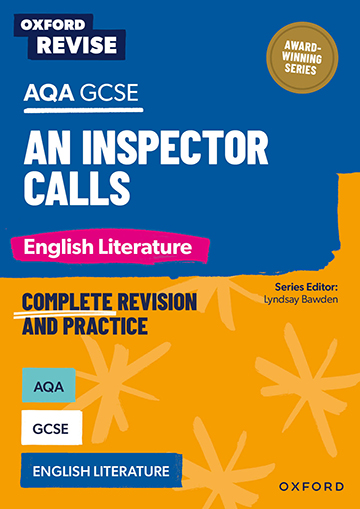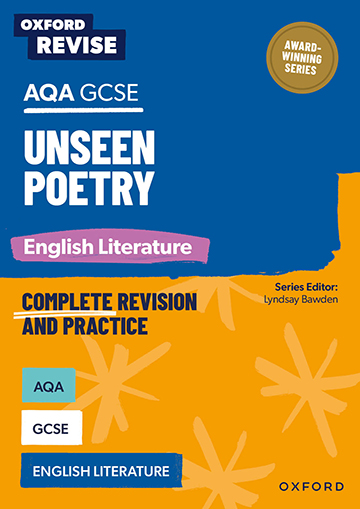How to Revise Effectively for your GCSE English Literature exam?
Lyndsay Bawden provides tips for how to revise effectively for your GCSE English Literature exam.
Preparing for your GCSE English Literature Exam
Revising for GCSE English Literature exams can feel like a daunting task, but with the right approach, you can make your study sessions productive and even enjoyable. Success in the exam comes down to preparation, knowing your texts, and plenty of practice. In this blog, we’ll walk through the best ways to revise effectively, with tips that will help you feel confident on exam day.
1. Get the right exam resources to support your learning for the GCSE English Literature exam
Before you start, make sure you have a high-quality revision guide. The Oxford Revise series from Oxford University Press is a fantastic option, providing clear explanations, useful practice questions, and key insights into the texts. Whether you are revising Macbeth, A Christmas Carol or Love and Relationships Poetry, having a structured guide will help you stay on track and ensure you are revising efficiently.
2. Make a revision plan to help you revise effectively for your GCSE English Literature exam
Next, make a plan. A well-structured revision timetable is essential. Break your revision down into manageable chunks—don’t try to cram everything at once! Set aside dedicated time for each text, ensuring you balance your focus across Shakespeare, the 19th-century novel, modern texts, and poetry.
3. Actively engage with the AQA GCSE English Literature texts
Passive revision, such as simply reading and highlighting, isn’t enough. Instead, revision for GCSE English Literature should involve engaging actively with your texts:
- Re-read key sections to reinforce your understanding.
- Create mind-maps for themes, characters, and key moments.
- Use flashcards for important quotes and literary devices.
- Summarise themes and character arcs in your own words to test your understanding.
Throughout each Oxford Revise guide you’ll find retrieval sections, so you can recap your knowledge and check that your revision is sticking!
4. Master poetry comparison for your GCSE English Literature Exam
For the poetry section of your GCSE English Literature exam, being able to make links between poems is crucial. When revising, try:
- Grouping poems by common themes and messages.
- Structuring your comparisons logically – start with key similarities or differences before analysing the writers’ methods.
- Practising with different poem pairings to develop flexibility in your responses.
5. Practise writing exam-style questions under timed conditions
The best way to prepare for your exam is to practise writing full answers. Examiners want well-structured essays that directly address the question. Try:
- Answering past paper questions to familiarise yourself with exam expectations.
- Timing yourself to improve speed and efficiency.
- Using the What/How/Why structure to build strong, focused paragraphs.
Oxford Revise Revision Guides comes with plenty of practice questions to test your exam-readiness.
6. To revise effectively for your GCSE English use multiple revision methods
Don’t just rely on written notes – use a variety of resources to enhance your learning:
- Listen to podcasts that analyse key texts and themes.
- Watch YouTube videos for engaging summaries and discussions.
- Join study groups or discuss ideas with friends and teachers to deepen your understanding.
Top five revision takeaways to help you revise effectively for your GCSE English exam
- Preparation is key – Create a revision timetable, and stick to it.
- Engage with the texts – Summarise, transform, and apply what you learn.
- Practice exam questions – Writing under timed conditions is essential.
- Know what to expect – Understand the format of each paper, and the types of questions.
- Answer the questions that are set, not the ones you wish had been set!
By following these strategies when revising for GCSE English Literature, you’ll develop a confident understanding of your texts and the exams, and feel more prepared when you walk into the exam hall.
Good luck with your revision!
Found this You Tube article useful? If so, watch more from Lyndsay Bawden on the Oxford Revise YouTube Channel.
Useful links
Revision books

AQA GCSE English Literature: An Inspector Calls
Build your knowledge and skills for AQA GCSE An Inspector Calls. Revise everything you need to know to do well in the exam, from themes of social responsibility to key Sybil Birling quotes.

AQA GCSE English Literature: Unseen Poetry
Revise everything you need to know to do well in the AQA GCSE Unseen Poetry part of your exam. You will build your skills and knowledge in a range of poems in the AQA course, with plenty of analysis and exam practice.